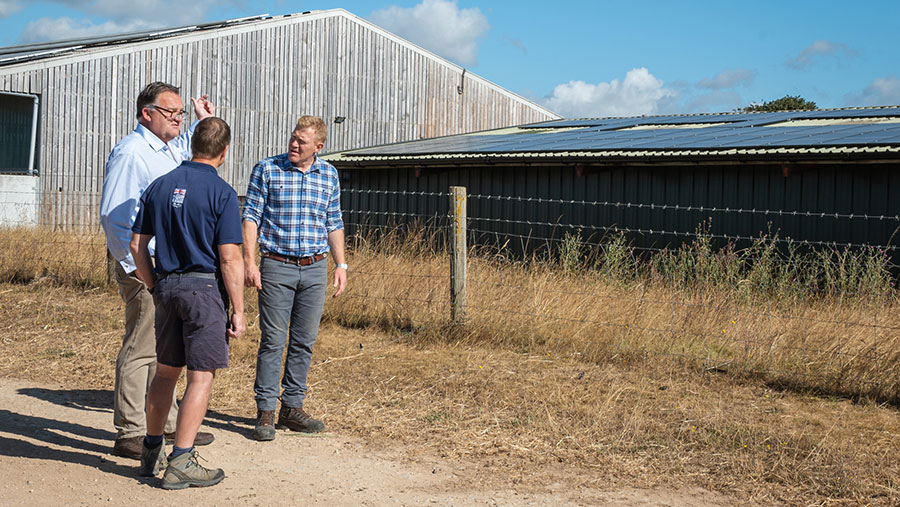Solar companies report surge in sales of panels to farmers
 Adam Henson talks solar with Duncan Andrews and Ben Harrison of MyPower © Cotswold Farm Park
Adam Henson talks solar with Duncan Andrews and Ben Harrison of MyPower © Cotswold Farm Park Solar panel suppliers are reporting unprecedented demand from farmers, as electricity costs continue to soar.
The rise in energy prices carries an additional sting for many businesses which, unlike individual consumers, do not benefit from the protection of a price cap.
Many farm buildings provide stable and easily accessible roof spaces that make ideal sun-traps for solar panel installation, allowing farmers to generate their own electricity to power anything from shed lighting to dairy parlours and heat lamps.
See also: Large-scale solar farms a threat to food security, MPs warn
Ben Harrison, managing director at solar panel supplier MyPower, has seen a 350% increase in demand so far this year, with 27,000 panels installed on farm buildings, compared with 7,000 in 2021.
“This has been driven by significant price increases in electricity; 12 months ago farmers were paying 15-17p/unit, but current contract rates are 35-45p/unit, so there’s a threefold cost increase,” he said.
“A typical dairy farmer could be using 100,000-150,000 units of electricity a year which, based on figures from 12 months ago, would have equated to about £15,000/year.
“At current contract rates, that would be more like £45,000/year, meaning an additional £30,000 for a sector that can be struggling at the best of times.”
With solar panels installed, farmers could produce about 25% of their energy requirements, then sell any surplus back to the grid. Previously, this would be priced at 5p/unit, but current inflated rates are seeing farmers selling back to the grid for 10-35p/unit, explained Mr Harrison.
Net-zero target
Countryfile presenter Adam Henson recently installed a second batch of solar panels on his barn roofs at his farm in the Cotswolds. The decision was driven by a number of factors, including meeting the NFU’s net-zero target by 2040.
Mr Henson said: “We’re trying to reduce our carbon footprint, and we’re looking very carefully at our effect on the environment. In the agricultural side of the business, we’re looking at our fertiliser inputs, all the environmental work we do and the way we manage our grassland and feed our cattle.
“The solar panels will provide 25% of the business’ energy needs, and will reduce our energy bills by about 20%. Crucially, it will also give us more energy security as supply fluctuates in price and become more insecure.”
The solar panels are also a cost-effective business decision for Mr Henson’s Cotswold Farm Park. “This [energy] will cost us 3-4p/unit, whereas buying from the national grid costs 30-40p/unit, so there’s a massive difference.”
Drivers
Jonathan Scurlock, chief adviser for renewable energy and climate change at the NFU, said there were several drivers for the upturn in roof solar panel installation among farmers.
“The economics largely speak for themselves, and the [solar] market is experiencing moderate, if not vigorous, growth,” Dr Scurlock said.
“The more energy you can generate yourself on farm, the more you are contributing to the decarbonisation of the national economy. Now it’s about energy independence rather than being at the mercy of energy providers”.
